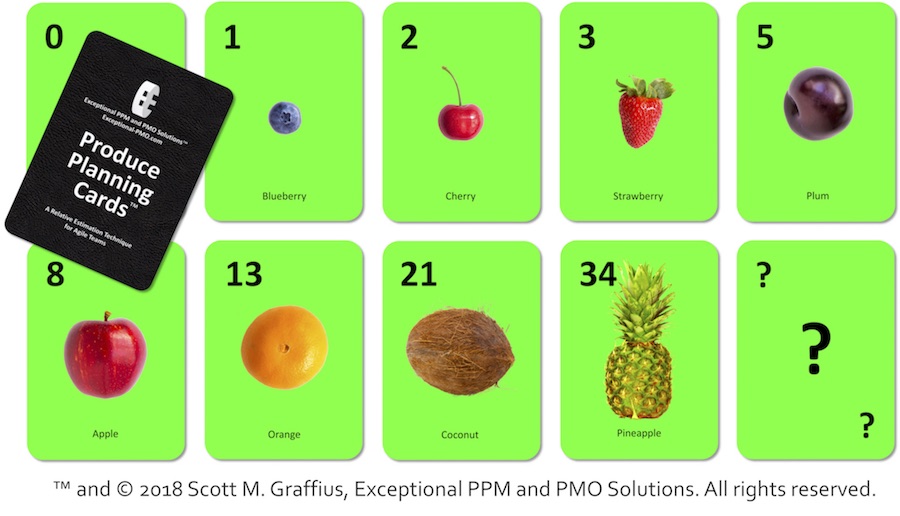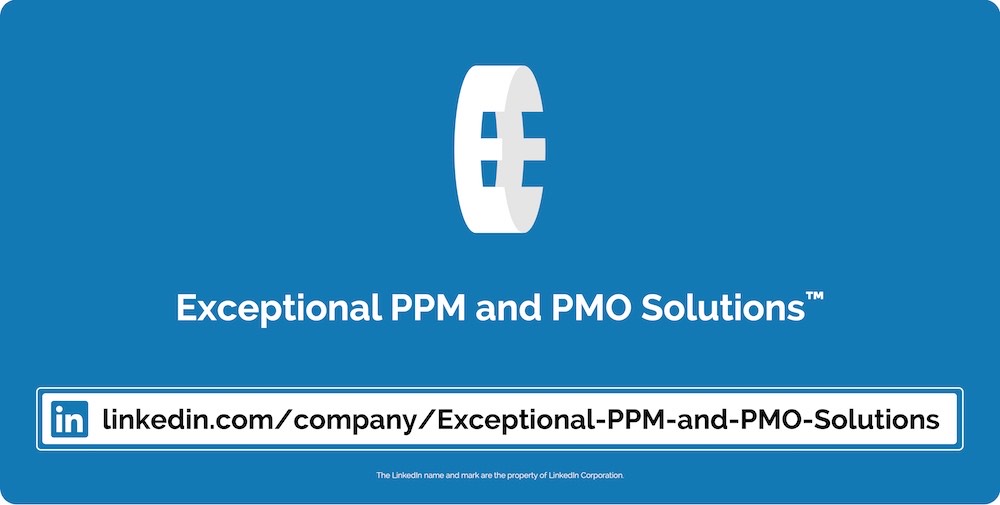Produce Planning Cards - 54 cards per deck
MERCH: Produce Planning Cards™ for Agile Teams
02 August 2019
Planning cards help agile teams estimate work. Products for sale typically involve cards with numbers (exempli gratia, 0 … 34) or sometimes alternatives such as t-shirt sizes (exempli gratia, XS … XL).
Custom agile planning cards, Produce Planning Cards™, were created by Exceptional PPM and PMO Solutions™. They feature a unique combination of both number values and images of fruit. For example, the 1 card has the number 1 and a picture of a blueberry, while the 34 card has the number 34 and a picture of a pineapple. With these cards, estimators can reference the numbers, the different size fruit, or both. "Produce" in the name of the cards has a double meaning: It relates to both the noun produce (specifically fruit) and the verb produce (as in to create). This is explained below.
The Produce Planning Cards™ were originally developed as a promotional item, distributed to clients of Exceptional PPM and PMO Solutions™. Reactions were incredibly positive, and several people subsequently asked how they could get their own set. Based on demand, Produce Planning Cards™ are now available for purchase while supplies last. This brief article provides an overview and update on the product.



The Development Team—which may be comprised of business analysts, coders, testers, etc.—collaboratively estimates each item in the product backlog in story points. Story points are a relative measure of complexity.
Participants
Frequency
Time-box (not to exceed duration)
Prerequisites/Inputs
Suggested Steps
Options
Some organizations use a subset of the cards and slice product backlog items when the estimate is "too large." Here's an example:

— 0 (No picture)
— 1 (Blueberry)
— 2 (Cherry)
— 3 (Strawberry)
— 5 (Plum)
— 8 (Apple)
— 13 (Orange)
— 21 (Coconut)
— 34 (Pineapple)
— "?” (No picture)

While supplies last, Produce Planning Cards™ are $9.95 per set plus sales tax and shipping. For additional information and to place an order, visit our MERCH page.


Let's Connect

Connect with us on LinkedIn, Twitter, and Facebook.

© Copyright 2019 Scott M. Graffius, Exceptional PPM and PMO Solutions™. All rights reserved. This material may not be published, broadcast, rewritten or redistributed without the express written permission of Scott M. Graffius/Exceptional PPM and PMO Solutions™.

Custom agile planning cards, Produce Planning Cards™, were created by Exceptional PPM and PMO Solutions™. They feature a unique combination of both number values and images of fruit. For example, the 1 card has the number 1 and a picture of a blueberry, while the 34 card has the number 34 and a picture of a pineapple. With these cards, estimators can reference the numbers, the different size fruit, or both. "Produce" in the name of the cards has a double meaning: It relates to both the noun produce (specifically fruit) and the verb produce (as in to create). This is explained below.
The Produce Planning Cards™ were originally developed as a promotional item, distributed to clients of Exceptional PPM and PMO Solutions™. Reactions were incredibly positive, and several people subsequently asked how they could get their own set. Based on demand, Produce Planning Cards™ are now available for purchase while supplies last. This brief article provides an overview and update on the product.

Video: Produce Planning Cards™ Help Agile Teams Estimate Work

Product Specs
- Type of cards: Poker sized
- Number of cards per deck: 54
- Dimensions in inches: 2.48 x 3.46
- Dimensions in mm: 63 x 88
- Printing: Full color print
- Material stock: 330 GSM professional weight stock
- Material finish: Finest quality, superior smooth finish
- Material sourcing: Printer sources materials from well-managed forests, and it supports green practices
- Printer: Printer is a prominent manufacturer in the gaming industry

Additional Information Including Suggested Usage
The Development Team—which may be comprised of business analysts, coders, testers, etc.—collaboratively estimates each item in the product backlog in story points. Story points are a relative measure of complexity.
Participants
- Product Owner
- Development Team
- Scrum Master (facilitator/observer)
Frequency
- Once or twice per sprint
Time-box (not to exceed duration)
- One hour for each week of the sprint
- It’s a common practice to limit each meeting to one hour and have multiple meetings as appropriate
Prerequisites/Inputs
- Product backlog containing user stories, bugs, and other requirements
- One set of planning cards for each member of the Development Team
Suggested Steps
- 1. If each member of the Development Team does not already have their own set of planning cards, the Scrum Master provides materials as needed
- 2. The Product Owner describes an item (a user story, bug, or other requirement) from the product backlog and mentions its intent and business value
- 3. Each member of the Development Team silently picks a card best representing their assessment of the complexity of the work and places the card face-down
- 4. After all of the Development Team members have made their selections, the cards are turned face-up, and the values are read aloud
- 5. If all of the selections have the same value, the Product Owner records it as the estimate, and that completes the exercise for the item; otherwise, proceed to the next step
- 6. Team member(s) who gave an outlier value —such as someone who gave a high value and/or someone who gave a low value—explain their reasoning
- 7. After a brief discussion, the team may take the most common value (the mode average) as the estimate or they may play another round of this planning game (steps 3-7)
- 8. Steps 2-7 are repeated until each item in the product backlog has been estimated
- 9. The Product Owner updates the product backlog with the estimate values
Options
Some organizations use a subset of the cards and slice product backlog items when the estimate is "too large." Here's an example:
- Development Team uses cards with the following values: 0, 1, 2, 3, 5, 8, 13, and 21
- Predetermined that 21 is "too large"
- If a product backlog item is estimated at 21, it is sliced into two or more parts in collaboration with the Product Owner, and the resulting smaller items are estimated by the Development Team

What's Included
- Each deck of Produce Planning Cards™ contains four sets of cards—enough for four estimators
- Each of the four sets has a unique color on the front side of cards—it’s in either blue, green, orange, or yellow
- Cards are based on the Fibonacci sequence, where every number after two is the sum of the two preceding numbers
- Each set includes cards with the following values and images:
— 0 (No picture)
— 1 (Blueberry)
— 2 (Cherry)
— 3 (Strawberry)
— 5 (Plum)
— 8 (Apple)
— 13 (Orange)
— 21 (Coconut)
— 34 (Pineapple)
— "?” (No picture)
- Each deck includes instructions
- Each deck comes in a storage case

Produce Planning Cards™ are Available for a Limited Time
While supplies last, Produce Planning Cards™ are $9.95 per set plus sales tax and shipping. For additional information and to place an order, visit our MERCH page.


Let's Connect

Connect with us on LinkedIn, Twitter, and Facebook.

© Copyright 2019 Scott M. Graffius, Exceptional PPM and PMO Solutions™. All rights reserved. This material may not be published, broadcast, rewritten or redistributed without the express written permission of Scott M. Graffius/Exceptional PPM and PMO Solutions™.
